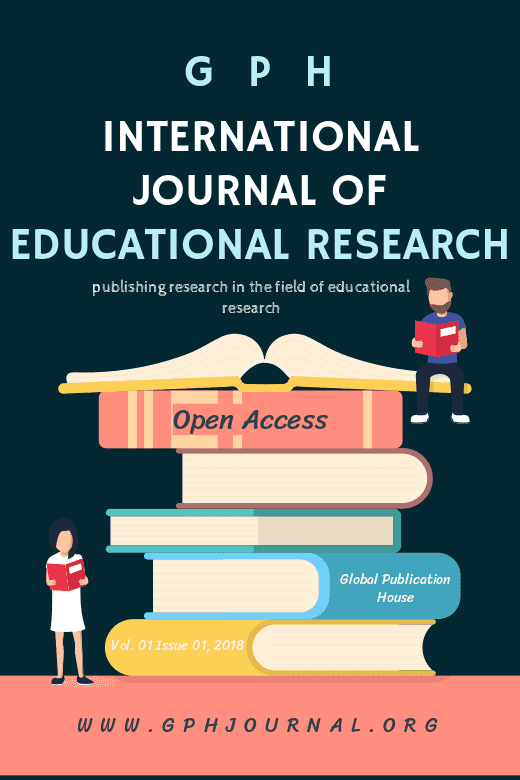Enhancing Computer Science Students’ Retention through Video, Animation and Audio Voice Thread Modes in Colleges of Education in North-Central Nigeria
Abstract
Achievement in a subject is more meaningful when a learner is able to retain the knowledge gained for a longer period of time. This study therefore focused on the need to enhance college of education students’ retention through video, animation and audio voice thread modes in North-central Nigeria. Three research questions raised were answered and three null hypotheses were also tested at 0.05 level of significance. The study adopted a quazi-experimental design in which intact classes of students in participating schools were used. A multi-stage sampling technique was used and a total of 210 students constituted sample size of the study. Intact classes of students were randomly assigned to experimental group I (voice thread video mode), experimental group II (voice thread animation mode), and the control group (voice thread audio mode). Voice thread modes were used as treatment instrument while computer science achievement test which was administered at posttest and retention test was used for data collection. The instrument was satisfactorily subjected to validation and reliability checks. Data collected were analyzed using mean, standard deviation and Analysis of Covariance statistics. Findings that emanated from the study revealed that the retention ability of both male and female students were enhanced by video and animation voice thread modes better than the audio mode. It was recommended that these two modes should be integrated in teaching and learning in colleges of education for improved retention of students in computer science.
Downloads
References
Archambault, L. & Carlson, D. (2011). Poetry in motion: using voicethread to prepare 21st century English teachers. In: Koehler, M. and Mishra, P. (eds.), Society for Information Technology & Teacher Education International Conference. Nashville, Tennessee, USA: Association for the Advancement of Computing in Education (AACE)
Ajai, J. T.,&Imoko, I. I. (2015).Gender Differences in Mathematics Achievement and Retention Scores: A Case of Problem-Based Learning Method. International Journal of Research in Education and Science (IJRES), 1(1), 45 – 50
Egbunu, C.O., Agbo, A., Egwu, A. O.,&Anyagh, P.I. (2017). Effects of Computer Aided Instruction on Senior Secondary School Students Retention in Mathematics in Markurdi Metropolis of Benue State, Nigeria: International Journal of scientific and research publication, 7 (7)
Eze, T.T, Ezenwafor, J. I., &Obidile, J. I. (2016). Effects of Gender on Students Academic Performance and Retention in Financial Accounting in Technical Colleges: British Journal of Education, Society and Behavioural Sciences, 15 (4) 1-9
Falode, O. C., Adewale, I. A., Ilobeneke, S. C., Falode, M. E. & Robinson, A. O. (2015). Effects of discussion instructional strategy on achievement and retention of secondary school students in human geography in Minna, Nigeria. Journal of Scientific and Engineering Research, 2(4), 78-84. Available online at:http://jsaer.com/archive/volume-2-issue-4-2015
Holzberger, D., Philipp, A., &Kunter, M. (2013). How teachers' self-efficacy is related to instructional quality. A longitudinal analysis.Journal of Educational Psychology, 105, 774e786.http://dx.doi.org/10.1037/a0032198.
Isifanus, B. (2017). Effects of Computer – Based Instruction on Retention and Performance in Algebraic Word Problems among Junior Secondary School Students in Kaduna State, Nigeria.
Olugbemi, P. (2013). Multi- Media in education. In E. Adole, M.A. Ajileye, O. Olugbemi, T.O Idowu& M.F. Popoola (Eds) Application of Educational Technology (pp. 50-100). Abuja Yinkus and Sons Enterprises.
Sayan, H. (2015). The effects of computer games on the achievement of basic Mathematics skills. Educational Research Review, 10 (22), 2846-2853
Sing C. A. (1999). Relative Effectiveness of Audio, and Static Visual Computer-Mediated Presentations.
Sun, Y. C. (2009). Voice Blog: an exploratory study of language learning.Language Learning & Technology, 13(2): 88–103.
Sulaiman, S. (2012). .Researchers’ Companion.Kano: Samarib Publishers
Umar, H., Guga, A. & El- Yakub, U. (2015). Effects of co-operative learning strategy on Geography students’ Academic performance in senior secondary schools in Sokoto State, Nigeria.International Journal of Contemporary Applied Sciences, 2 (11), 20 – 21

Copyright (c) 2021 IJER-International Journal of Educational Research

This work is licensed under a Creative Commons Attribution-NonCommercial-NoDerivatives 4.0 International License.
Author(s) and co-author(s) jointly and severally represent and warrant that the Article is original with the author(s) and does not infringe any copyright or violate any other right of any third parties, and that the Article has not been published elsewhere. Author(s) agree to the terms that the GPH Journal will have the full right to remove the published article on any misconduct found in the published article.






















